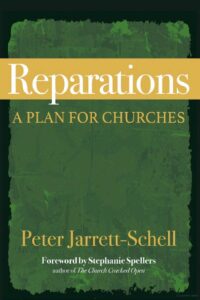The text used by our vestry for an introduction to church reparations was written by the Reverend Peter Jarrett-Schell, Rector of Calvary Episcopal Church, Washington, DC. Entitled Reparations: A Plan for Churches, the book draws upon Jarrett-Schell’s experience with draws on his experience as a member of the Reparations Committee in the Diocese of Washington, DC and as Rector of Calvary Episcopal Church, a historically Black church in the diocese.
We discovered an interview with Reverend Jarrett-Schell that was hosted by the Union of Black Episcopalians (UBE) in their series of monthly virtual talks (scroll down to the last talk): We’re Talking Now: Reparations: A Plan for Churches (November 19, 2023). In it, Jarrett-Schell explains his recommendations for church reparations processes. He tells us that while reluctant to write the book on his own, he decided to do so only with the advice and counsel of prominent Black leaders and in dialogue with them. In this talk, he gives two examples of churches who are moving along in very different approaches to repair and reparations. Continue reading


